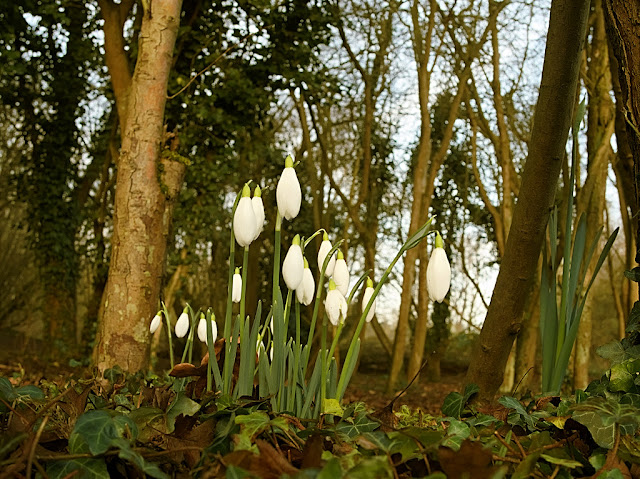 |
| Ice on Dickerson's Pit - 24 January 2017 The ice near the shore is richly textured A texture that is subtely altered around the white lump of ice. |
Why do people feel compelled to throw things on the ice? No sooner had the ice appeared, then stones, logs, branches, balls, and general rubbish littered the frozen surface. It is as if the sight of its smooth white surface was too much for mortal eyes and had to be covered up. But as my first photograph shows, the surface of the ice close to the shore is richly textured, even without the debris.
 |
| Frosty Orchard - 22 January 2017 Almost the only time I have successfully photographed the orchard. |
The same cold spell produced a couple of mornings when conditions were right to cover not only the low growing vegetation, but also the branches of at least some of the trees with rime.
Apart from the frost, little has changed over the last couple of months. The changes that have happened are the gradual growth of plants such as cow parsley, comfrey and nettles. But this new growth is only a couple of inches high, and make almost no impact on the appearance of the park.
 |
| Clematis Fruit - 24 January 2017 Fluffy white balls catching the light |
Far more apparent are the fluffy white clematis fruit which are still in abundance on the climber, and very noticeable when they catch the low sun.
 |
| Snowdrops - 19 February 2017 A typical scene in the woods in the park with an isolated clump of snowdrops growing amongst the trees. |
During February, the snowdrops finally blossomed, probably at least a month later than last year. The name 'snowdrop' refers to the large pendants or drops that were worn by ladies in the sixteenth century either as earrings or on brooches. I was surprised to find that alternative names for these flowers include death's tear; and that the only folk lore surrounding them is that it is unlucky to take them indoors.
Conversely, snowdrops are seen as a symbol of hope. One legend has it, that after Adam and Eve were evicted from the garden of Eden, Eve became depressed with the apparently endless cold wintry weather. To cheer her up, an angel appeared and changed some of the snowflakes into flowers, as a sign that the dreary weather would eventually cease.
 |
| Jetty - 26 February 2017 The willows are probably even more colourful in February than they were in the autumn - their yellowing leaves drab compared to their branches at the end of winter. |
A far more earthly sign of the imminence of spring is the gold and orange colours of the willow branches at this time of year.
Next: Tree Down

No comments:
Post a Comment